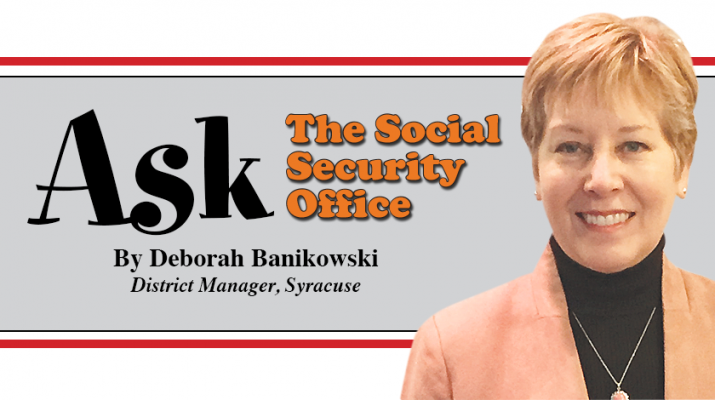By Deborah Banikowski
District Manager, Syracuse
If you rely on Supplemental Security Income (SSI) payments or Social Security Disability (SSDI) benefits and want to start working or return to work, we can help.
A Plan for Achieving Self-Support (PASS) is a rule under SSI to help people with disabilities return to work. If you receive SSI or could qualify for SSI after setting aside income or resources so you can pursue — or achieve — a work goal, you could benefit from a PASS.
How does a PASS help someone return to work?
• We base SSI eligibility and payment amounts on income and resources (things of value that the individual owns).
• PASS lets a disabled individual set aside money and things he or she owns to pay for items or services needed to achieve a specific work goal.
• The objective of the PASS is to help disabled individuals find employment that reduces or eliminates SSI or SSDI benefits.
You can read all about the PASS program at www.ssa.gov/pubs/EN-05-11017.pdf.
The plan must be in writing, and Social Security must approve it beforehand. To start, contact your local Social Security office for an application (Form SSA-545-BK) or you can access the form at www.ssa.gov/forms/ssa-545.html.
There are many people who can help you write a PASS, including a Ticket to Work service provider, a vocational counselor or a relative. Social Security’s Ticket to Work (ticket) program supports career development for SSDI beneficiaries and SSI recipients who want to work and progress toward financial independence. The ticket program is free and voluntary. Please call the Ticket to Work Help Line at 1-866-968-7842 or 1-866-833-2967 (TTY) Monday through Friday, 8 a.m. to 8 p.m. ET to learn more about the Ticket program.
Your job isn’t just a source of income — it can be a vehicle to independence or a beginning to fulfilling your dreams. Let Social Security’s PASS help you achieve your goals.
Q&A
Q: Is it true I can save about $4,900 per year if I qualify for Social Security’s Extra Help with the Medicare prescription drug program?
A: Yes. If your income and resources meet the requirements, you can save nearly $5,000 in prescription costs each year. Resource limits for 2020 are $14,610 (or $29,160 if you are married and living with your spouse). Income limits are $19,140 (or $25,860 if you are married and living with your spouse). If your income or resources are just a bit higher, you might be eligible for some help with prescription drug costs. To learn more, visit www.socialsecurity.gov/prescriptionhelp.
Q: My spouse died recently and my neighbor said my children and I might be eligible for survivors benefits. Don’t I have to be retirement age to receive benefits?
A: No. As a survivor, you can receive benefits at any age if you are caring for a child who is receiving Social Security benefits and who is under age 16. Your children are eligible for survivors benefits through Social Security up to age 19 if they are unmarried and attending elementary or secondary school full time. Keep in mind that you are still subject to the annual earnings limit if you are working. If you are not caring for minor children, you would need to wait until age 60 (age 50 if disabled) to collect survivors benefits. For more information about survivors benefits, read our publication Survivors Benefits at www.socialsecurity.gov/pubs.
Q: Why is it so important that my baby have a Social Security number?
A: Your child may need a Social Security number if you are planning to open a bank account, buy savings bonds, obtain medical coverage, or apply for government services for the child. Your child will also need a Social Security number if you are going to declare him or her on your taxes. Getting a Social Security number for your newborn is voluntary, but it is a good idea to apply when your child is born. You can apply for a Social Security number for your baby when you apply for your baby’s birth certificate. The state agency that issues birth certificates will give us your child’s information and we will mail you a Social Security card with the child’s Social Security number. Visit www.socialsecurity.gov/ssnumber for more information.

